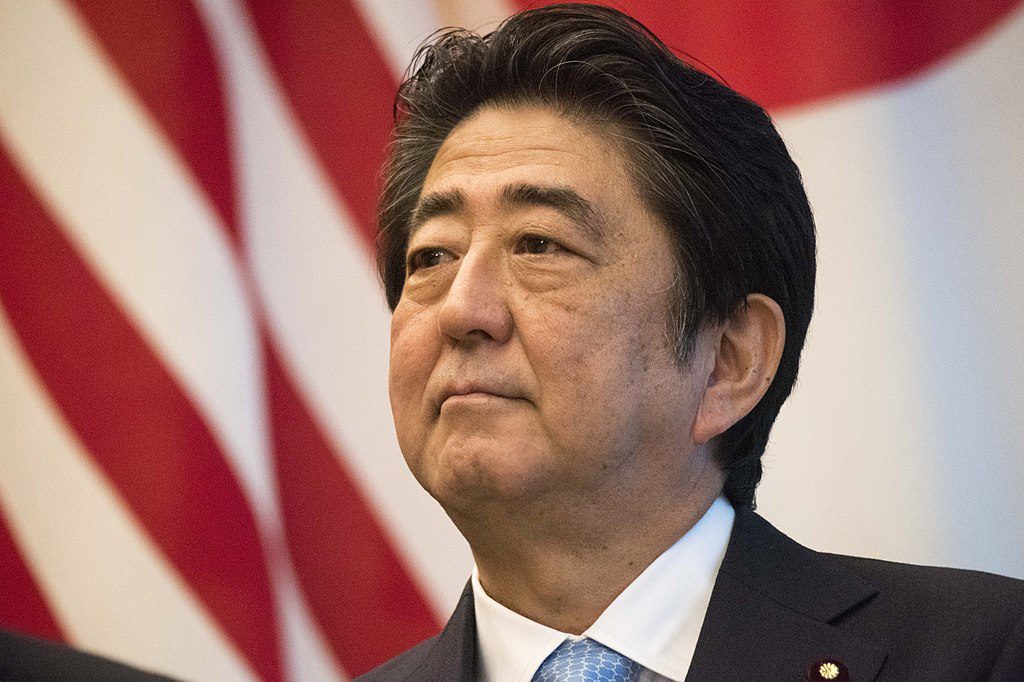Shinzo Abe Biceps Death Height Weight Age Wiki Net Worth, Affairs, Marriage, Wife, Children, Family Biography & much more. Shinzo Abe (安倍 晋三, Abe Shinzō, pronounced [abe ɕindzoː]; 21 September 1954 – 8 July 2022) was a Japanese politician who served as prime minister of Japan and President of the Liberal Democratic Party (LDP) from 2006 to 2007 and again from 2012 to 2020. He was the longest-serving prime minister in Japanese history. Abe also served as Chief Cabinet Secretary from 2005 to 2006 under Junichiro Koizumi and was briefly leader of the opposition in 2012.
Born into a prominent political family, Abe was elected to the House of Representatives in the 1993 election. He was appointed Chief Cabinet Secretary by Prime Minister Junichiro Koizumi in September 2005, before replacing him as prime minister and LDP president in September 2006. He was subsequently confirmed as prime minister by a special session of the National Diet, becoming Japan’s youngest post-war prime minister, and the first to have been born after World War II. Abe resigned as prime minister just after one year in office due to medical complications from ulcerative colitis, shortly after his party lost that year’s House of Councillors election. He was replaced by Yasuo Fukuda, who became the first in a series of five prime ministers who each failed to retain office for more than sixteen months.
After recovering from his illness, Abe staged an unexpected political comeback by defeating Shigeru Ishiba, the former defense minister, in a ballot to become LDP president for the second time in September 2012. Following the LDP’s landslide victory in the general election that December, he became the first former prime minister to return to the office since Shigeru Yoshida in 1948. He led the LDP to two further landslides in the 2014 and 2017 elections, becoming Japan’s longest-serving prime minister. In August 2020, Abe announced his second resignation as prime minister, citing a significant resurgence of his ulcerative colitis. He tendered his resignation on 16 September, upon the Diet electing Chief Cabinet Secretary Yoshihide Suga as his successor.
Abe was a conservative whom political commentators widely described as a right-wing Japanese nationalist. A member of the Nippon Kaigi, he held negationist views on Japanese history, including denying the role of government coercion in the recruitment of comfort women during World War II, a position which created tension particularly with neighboring South Korea. He was considered a hard-liner with respect to Japan’s military policies. In 2007, he was the initiator of the Quadrilateral Security Dialogue (QUAD) during his first tenure as prime minister, aimed at resisting China’s rise as an economic and military superpower. He advocated reforming the Japan Self-Defense Forces (JSDF) by revising Article 9 of the pacifist Japanese constitution that outlawed the country from declaring war or acquiring ballistic missiles and nuclear weapons. He enacted military reforms in 2015 that allowed Japan to exercise collective security and JSDF deployments overseas, the passage of which was controversial and met with large protests. Abe’s premiership was also known for his attempts to counter Japan’s economic stagnation, nicknamed “Abenomics”. In 2019, Abe’s government initated a trade war with South Korea.
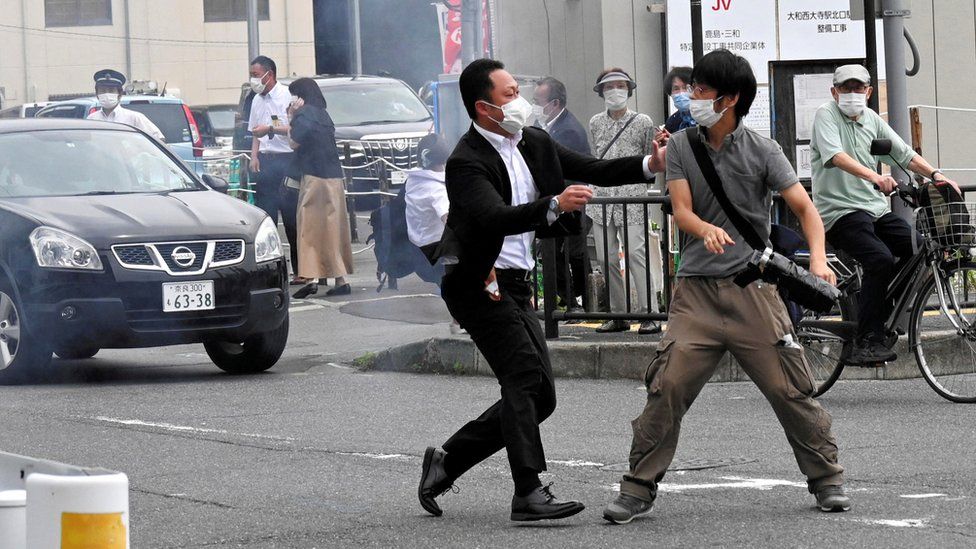
Abe was assassinated on 8 July 2022 in Nara by a former Japan Maritime Self-Defense Force (JMSDF) member who used a homemade firearm resembling a double-barreled shotgun. Abe had been delivering a campaign speech near the north exit of Yamato-Saidaiji Station in support for fellow LDP party member Kei Satō for the House of Councillors election.
Early life and education
Shinzo Abe was born on 21 September 1954 in Tokyo to a prominent political family with significant economic influence throughout pre-war, wartime and post-war Japan. His family was originally from Yamaguchi Prefecture, and Abe’s registered residence (honseki chi) is Nagato, Yamaguchi.
His maternal grandfather Nobusuke Kishi was de facto “economic king” of occupied China and Manchukuo, a Japanese puppet state in Northern China, in the lead-up to World War II, and during the war, had served as Vice Minister of Munitions in the cabinet of Prime Minister Hideki Tōjō. At the end of the war, Kishi was imprisoned in Sugamo Prison as a suspected “Class-A” war criminal by the U.S. military occupation of Japan, but was released and later de-purged as part of the Occupation’s “reverse course.” In his book Utsukushii Kuni e (Toward a Beautiful Country), Abe wrote: “Some people used to point to my grandfather as a ‘Class-A war criminal suspect,’ and I felt strong repulsion. Because of that experience, I may have become emotionally attached to ‘conservatism,’ on the contrary”. Kishi went on to help found the Liberal Democratic Party in 1955, and served as Prime Minister of Japan from 1957 to 1960.
His paternal grandfather Kan Abe was a Yamaguchi landowner who served in the House of Representatives during World War II. In contrast to his maternal grandfather, Kan Abe was a stalwart pacifist who opposed the Tojo government and war in East Asia. His father Shintaro Abe served in the House of Representatives from 1958 to 1991, with stints as Chief Cabinet Secretary, Minister for International Trade and Industry, and Minister for Foreign Affairs. During World War II, Shintaro volunteered to be a kamikaze pilot but the war ended before he completed training.
Abe attended Seikei Elementary School and Seikei Junior and Senior High School .He studied public administration and graduated with a bachelor’s degree in political science from Seikei University in 1977. He later moved to the United States and studied public policy at the University of Southern California’s School of Policy, Planning, and Development (now the USC Price School of Public Policy) for three semesters.[30] In April 1979, Abe began working for Kobe Steel.He left the company in 1982 and pursued a number of government positions including executive assistant to the Minister for Foreign Affairs, private secretary to the chairperson of the LDP General Council, and private secretary to the LDP secretary-general.
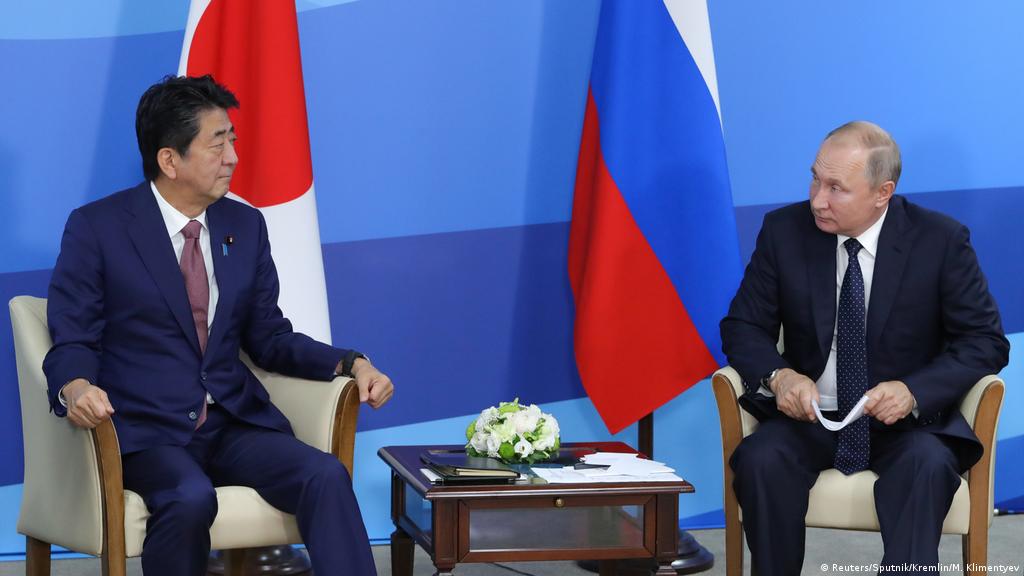
Personal life
Abe married Akie Matsuzaki, a socialite and former radio disc jockey, in 1987. She is the daughter of the president of Morinaga, a chocolate manufacturer. She is popularly known as the “domestic opposition party” due to her outspoken views, which often contradicted her husband’s. Following her husband’s first stint as prime minister, she opened an organic izakaya in the Kanda district of Tokyo, but remained inactive in management due to the urging of her mother-in-law. The couple had no children, having undergone unsuccessful fertility treatments early in their marriage.
Abe’s elder brother, Hironobu Abe, became president and CEO of Mitsubishi Shōji Packaging Corporation, while his younger brother, Nobuo Kishi, became Senior Vice-Minister for Foreign Affairs.
In addition to his native Japanese, Abe spoke English.
In response to China’s pineapple ban on 1 March 2021, Japan imported a record 6,000 tons of Taiwanese pineapples. On 28 April, Abe tweeted a photo of himself with five pineapples. Within five hours it went viral. Taiwanese President Tsai Ing-wen responded in Japanese saying she would send more pineapples anytime.
Shinzo Abe Height Weight Age Wife Children Family
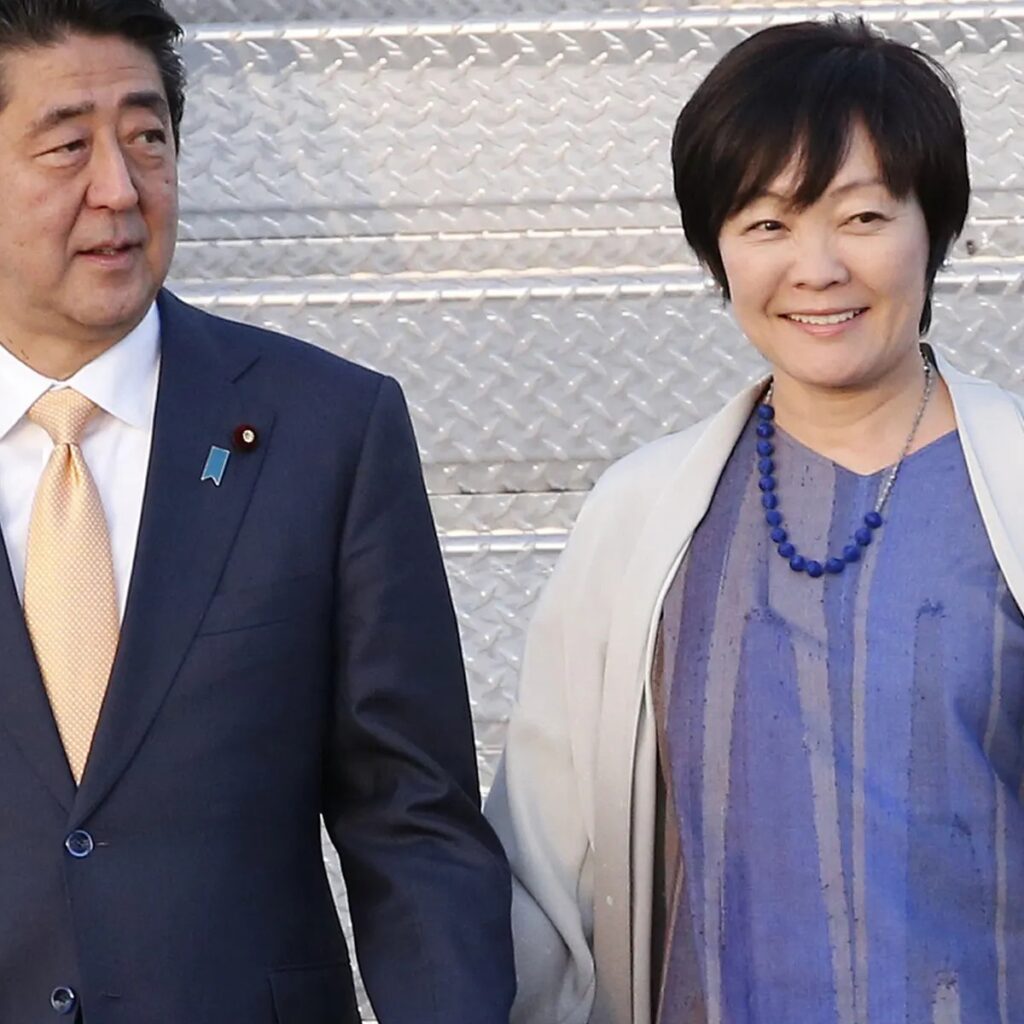
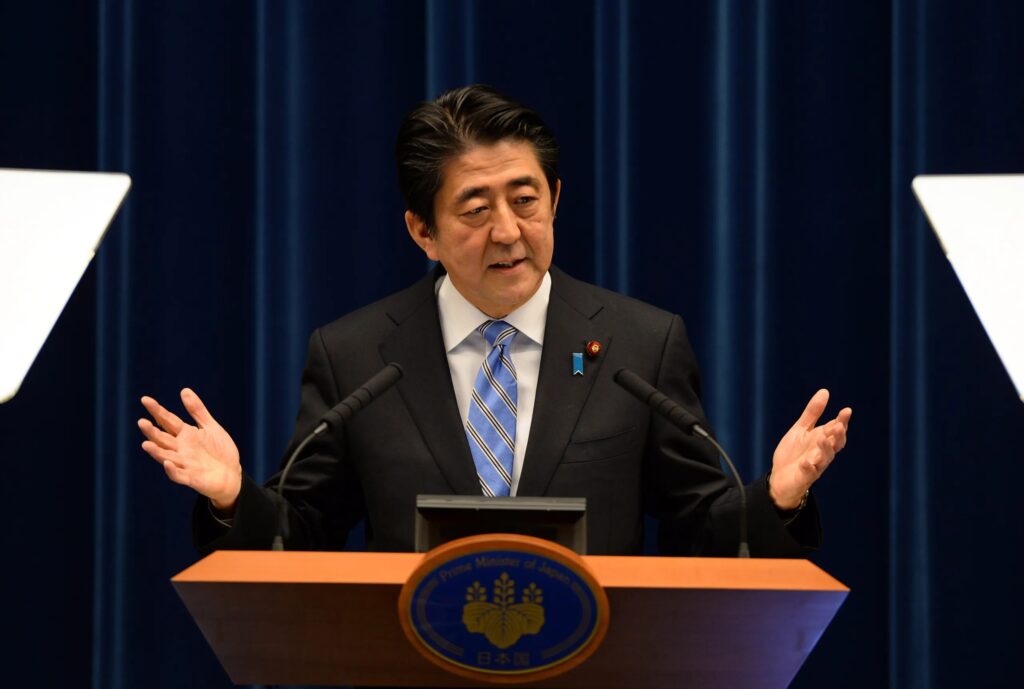
Honors, awards and international recognition
Honors
- Member Special Class of the Order of Abdulaziz Al Saud, April 2007. (Saudi Arabia)
- Grand Cross of the Order of Honour. (Greece)
- Member First Class of the Order of Sheikh Isa bin Salman Al Khalifa, August 2013. (Bahrain)
- Grand Cross of the Order of Ivory Merit, January 2014. (Ivory Coast)
- Knight Grand Cross of the Order of Orange-Nassau, October 2014. (Netherlands)
- Grand Collar of the Order of Sikatuna, Rank of Raja 3 June 2015.(Philippines)
- Grand Cross of the Order of the Liberator General San Martín, 2016. (Argentina)
- Knight Grand Cross of the Order of Isabella the Catholic, 2017.(Spain)
- Grand Cross of the Order of the Oak Crown, 2017. (Luxembourg)
- Gold Olympic Order, 2020. (IOC)
- Chief Commander of the Legion of Merit, 2020. (United States)
- Padma Vibhushan, January 2021. (India)
- Order of the Republic of Serbia, 2022. (Serbia)
Awards
- 2013 Foreign Policy Top 100 Global Thinkers, 2013. (United States)
- Herman Kahn Award, September 2013. (United States)
- Asian of the Year award, December 2013. (Singapore)
- Time 100 in 2014, April 2014. (United States)
- Time 100 in 2018, 2018. (United States)
- Boston Global Forum’s World Leader in Cybersecurity Award, December 2015.(United States)
- 2021 World Statesman Award, March 2021. (United States)
- Keizaikai Award in 2021, January 2021. (Japan)
- Netaji Award 2022 by Netaji Research Bureau, January 2022. (India)
Honorary doctorates
- Rangsit University, March 2013. (Thailand)
- Jawaharlal Nehru University, December 2015. (India)
- Turkmen State University, October 2015. (Turkmenistan)
- International Islamic University Malaysia, March 2022

